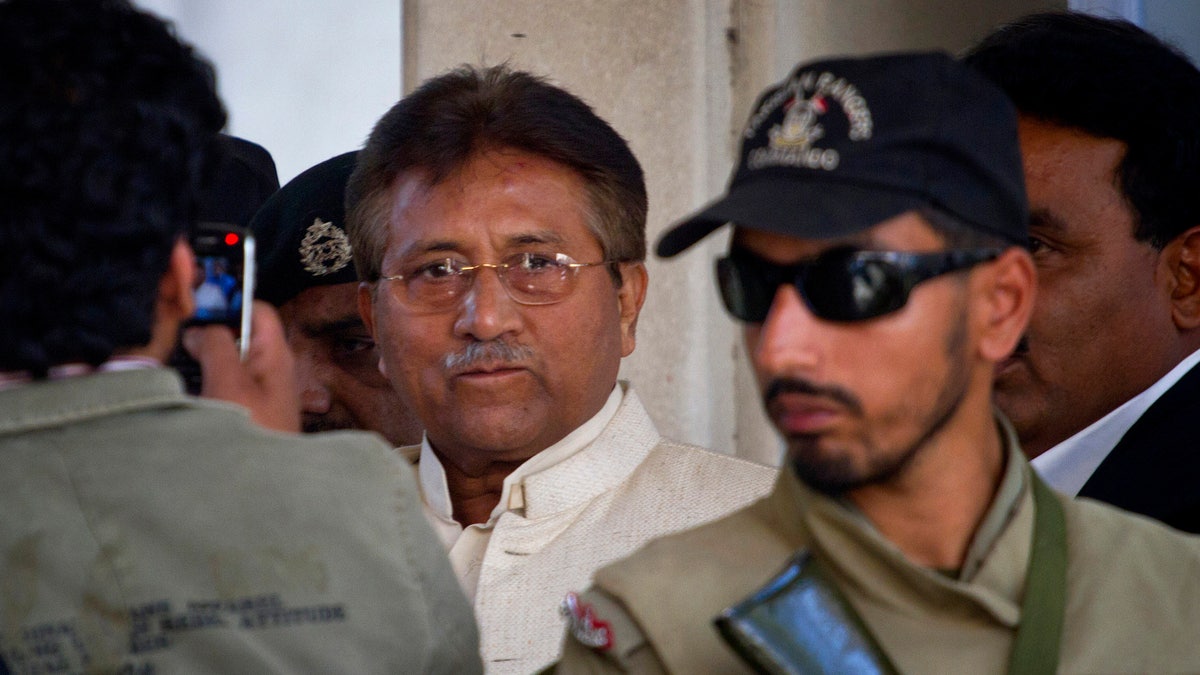
FILE -- In this Wednesday, April 17, 2013 file photo, Pakistan's former president and military ruler Pervez Musharraf, center, leaves after appearing in court in Rawalpindi, Pakistan. Pakistan's government plans to put former President Pervez Musharraf on trial for treason for declaring a state of emergency and suspending the constitution while in power, the interior minister said Sunday, Nov. 17, 2013. (AP Photo/Anjum Naveed, File) (The Associated Press)
ISLAMABAD – Pakistan's government plans to put ex-President Pervez Musharraf on trial for treason, the country's interior minister said Sunday. Musharraf, who came to power in a bloodless coup and became a U.S. ally after the Sept. 11, 2001, terror attacks, has faced a series of charges since returning to Pakistan after going into self-imposed exile for several years.
Here's a look at major events in Musharraf's life:
— Aug. 11, 1943: Pervez Musharraf born in New Delhi, which is now in India.
— Oct. 7, 1998: Musharraf becomes chief of the army.
— Oct. 12, 1999: Musharraf ousts Prime Minister Nawaz Sharif in a bloodless coup.
— Sept. 11, 2001: After the terror attacks, the U.S. demands Musharraf choose whether to ally with them or Pakistan's allies in neighboring Afghanistan, the Taliban. Musharraf chooses the U.S.
— April 30, 2002: Musharraf extends his term as president for five years by holding a controversial referendum.
— July 2007: Musharraf orders his forces to raid a mosque in downtown Islamabad where followers of a radical cleric were holed up. The raid leaves dozens of people dead and hardens militant opposition to Musharraf.
— Oct. 5, 2007: Musharraf issues an ordinance protecting officials from past corruption charges as part of a deal that paves the way for former leaders Benazir Bhutto and Sharif to return home and contest elections.
— Oct. 18, 2007: Bhutto returns from exile, surviving a massive bomb attack on her convoy in the port city of Karachi.
— Nov. 3, 2007: Musharraf declares a state of emergency and sacks the chief justice of the Supreme Court, triggering a nationwide protest movement led by lawyers that weakens his grip on power.
— Nov. 25, 2007: Sharif returns home from exile.
— Dec. 27, 2007: Bhutto is assassinated.
— Feb. 18, 2008: Pakistan holds nationwide elections. Bhutto's Pakistan People's Party wins the most seats.
— Aug. 18, 2008: Musharraf resigns from the presidency under pressure from main political parties.
— April 2009: Musharraf leaves Pakistan saying that he is going to lecture abroad. He does not return, essentially going into self-imposed exile.
— March 24, 2013: Musharraf returns home saying he wants to contest elections.
— April 18, 2013: Musharraf flees an Islamabad court after a judge revokes his bail in the case of detaining judges in 2007. He is later arrested.
— Aug. 20, 2013: Musharraf is formally indicted in connection with Bhutto's murder.
— Nov. 4, 2013: A judge grants bail to Musharraf in a case involving the 2007 mosque raid. That decision, as well as bail being granted in other cases against the former leader, paves the way for Musharraf's release from his lavish estate in the suburbs of Islamabad, where he was held under house arrest for some six months.
— Nov. 7, 2013: Pakistani authorities free Musharraf from house arrest, though he's not allowed to leave the country.
— Nov. 17, 2013: Pakistan's interior minister announces the government will try Musharraf for treason.
